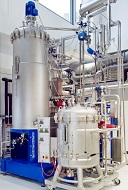
Efficient production strains form the basis for the development of biotechnological production processes. To maximize product formation, the metabolism is specifically altered at the genetic level to enable maximum carbon flux towards the product.
Classical metabolic engineering methods focus on targeted interventions in the genome. This is only possible with detailed knowledge of the metabolic network and the genes involved. Due to the high complexity of the central carbon metabolism and the biosynthetic pathways involved, this usually requires many targeted genetic interventions that must be well coordinated.
In contrast, adaptive laboratory evolution (ALE) enables the natural generation of microorganisms with desired properties. Here, the principles of evolution and selection are specifically exploited in the laboratory. Usually, adaptive laboratory evolution is carried out in a repeated batch process, to enable for example the conversion of previously hardly usable substrates or growth under unfavorable reaction conditions. Thus, the targeted properties must be coupled to the growth of the production organisms. By automating ALE in controlled stirred tank reactors, new mutants with desired metabolic properties can be generated much faster than before.
The objective of this research project is to further improve selected properties of Escherichia coli production strains for the production of L-cysteine by automated ALE in repeated batch processes. Afterwards, the process performances of isolated mutants will first be characterized in a standardized fed-batch process. The genomic alterations of isolated mutants showing improved process performances will then be identified by the project partner using next generation sequencing (NGS) and the effects of individual identified genetic alterations will be analyzed by reverse engineering of the original strain using a standardized fed-batch process.